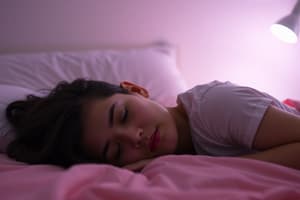Podcast
Questions and Answers
What is the recommended number of hours of sleep for adolescents per night?
What is the recommended number of hours of sleep for adolescents per night?
- 7-8 hours
- 5-6 hours
- 11-12 hours
- 9-10 hours (correct)
Which two processes regulate the sleep-wake cycle?
Which two processes regulate the sleep-wake cycle?
- Exercise and diet
- Adenosine and melatonin (correct)
- Caffeine and sugar intake
- TV watching and phone usage
What is the term used to describe individual differences in sleep patterns?
What is the term used to describe individual differences in sleep patterns?
- Phenotype
- Chronotype (correct)
- Biotype
- Genotype
What is a potential benefit of napping according to the text?
What is a potential benefit of napping according to the text?
Which disorder is described as causing difficulty falling or staying asleep?
Which disorder is described as causing difficulty falling or staying asleep?
What treatment option is mentioned for chronic insomnia in the text?
What treatment option is mentioned for chronic insomnia in the text?
What is the biggest misconception about learning English?
What is the biggest misconception about learning English?
How does the speaker suggest maintaining and improving English skills continuously?
How does the speaker suggest maintaining and improving English skills continuously?
What can happen if a person does not practice English for an extended period?
What can happen if a person does not practice English for an extended period?
How does the speaker suggest people in non-English-speaking countries live the language?
How does the speaker suggest people in non-English-speaking countries live the language?
What is emphasized as crucial for sticking with English learning and achieving fluency?
What is emphasized as crucial for sticking with English learning and achieving fluency?
What does the speaker recommend to improve English skills while having fun?
What does the speaker recommend to improve English skills while having fun?
What is suggested as a better approach than just studying English according to the speaker?
What is suggested as a better approach than just studying English according to the speaker?
Flashcards are hidden until you start studying
Study Notes
- Humans require seven to eight hours of sleep per night, while adolescents need ten hours.
- Sleep balances and regulates vital systems in the body.
- Two processes regulate the sleep-wake cycle: environmental cues and internal chemicals like adenosine and melatonin.
- Humans are diurnal species, most active during the day and sleep during the night.
- Cronotype refers to individual differences in sleep patterns: early birds and night owls.
- Early birds are more intelligent and productive than night owls, but this correlation lessens with age.
- Napping can lead to cognitive enhancement, motor ability improvement, increased productivity, and better mood.
- Ideal nap time is between 1:00 and 4:00 p.m., with 7 to 10 minutes being an effective power nap.
- Sleep disorders can impact physical, mental, social, and emotional functioning: insomnia, parasomnias, and sleep apnea.
- Insomnia is the most common sleep disorder, causing difficulty falling or staying asleep.
- Prescription drugs and melatonin supplements can treat chronic insomnia.
- Parasomnias include sleepwalking and night terrors, with unknown causes.
- Sleep apnea occurs when breathing is blocked during sleep, causing snoring.
- Weight loss, surgery, and proper sleep hygiene can address sleep apnea.
- Sleep hygiene includes avoiding cognitive arousal late in the day, avoiding long naps, and developing a regular sleep schedule.
Studying That Suits You
Use AI to generate personalized quizzes and flashcards to suit your learning preferences.




